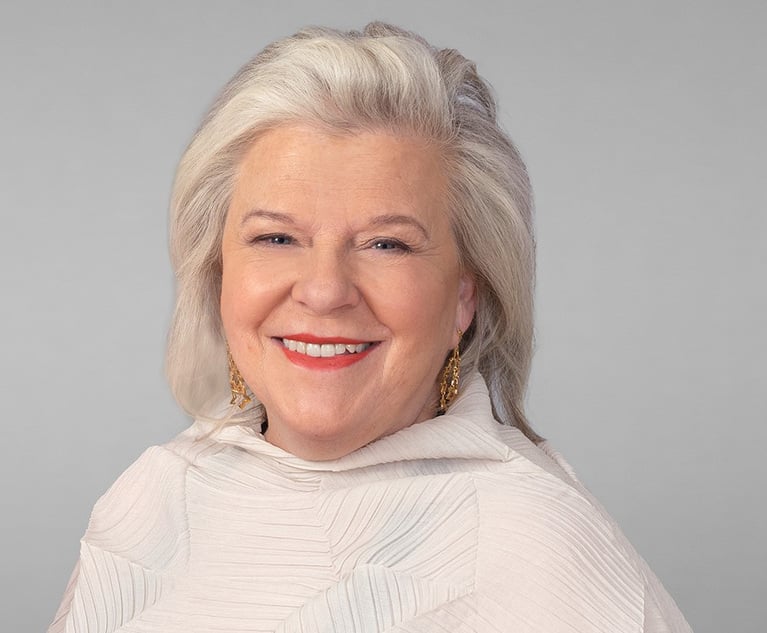31 Corporate Legal Departments Spent $240M With Minority- and Women-Owned Firms in 2018
The legal spend going to minority- and women-owned firms, which has grown significantly since 2010, comes at a time when corporations are seeking to influence the diversity of their outside counsel.
September 24, 2019 at 03:17 PM
2 minute read

The legal departments of 31 companies have spent a total of $1.6 billion with minority- and women-owned law firms since 2010 as part of an initiative administered by the National Association of Minority and Women Owned Law Firms.
In 2018 alone, the corporate legal departments at Google, 3M, Bank of America and Target, among others, spent $240 million with NAMWOLF firms. This year, Walgreens and Honda signed on to the initiative as well, bringing the total amount of participating clients to 33.
"The Inclusion Initiative makes a meaningful, positive impact on the legal profession by encouraging members to make tangible commitments to hiring diverse firms, helping them to thrive in the market," said Ann Kappler, senior vice president and deputy general counsel of initiative co-founder Prudential Financial, in a statement.
The initiative began in 2010 with just 42 participating minority- and women-owned law firms and 11 companies. The program's growth and legal spend demonstrate the growing power of clients as corporations look to influence the diversity of their outside counsel by targeting their bottom lines.
An open letter signed by more than 200 general counsel demanding more diverse legal representation in January lit a match under the diversity conversation this year. Organizations like Diversity Lab have leveraged client legal spend and networking in its marquee initiatives.
Within this area, many see women- and minority-owned law firms as essential to progress. Turo chief legal officer Michelle Fang, who spearheaded the open letter, promoted hiring these firms in a list of actionable steps released in the wake of the call to action.
"The commitment exhibited by each company helps ensure the success of minority- and women-owned law firms and furthers the important mission of diversifying the legal profession," said NAMWOLF board member William Delgado in a statement. "NAMWOLF is excited about its continued collaboration with the Inclusion Initiative for years to come."
|Similar Stories:
Frustrated With Big Law Diversity, Many Companies Are Looking Elsewhere
This content has been archived. It is available through our partners, LexisNexis® and Bloomberg Law.
To view this content, please continue to their sites.
Not a Lexis Subscriber?
Subscribe Now
Not a Bloomberg Law Subscriber?
Subscribe Now
NOT FOR REPRINT
© 2024 ALM Global, LLC, All Rights Reserved. Request academic re-use from www.copyright.com. All other uses, submit a request to [email protected]. For more information visit Asset & Logo Licensing.
You Might Like
View All
Simpson Thacher Launches in Luxembourg With Hires From A&O Shearman, Clifford Chance
3 minute read

A&O Shearman's Former U.S. Co-Chair to Leave Partnership

Trending Stories
- 1Friday Newspaper
- 2Judge Denies Sean Combs Third Bail Bid, Citing Community Safety
- 3Republican FTC Commissioner: 'The Time for Rulemaking by the Biden-Harris FTC Is Over'
- 4NY Appellate Panel Cites Student's Disciplinary History While Sending Negligence Claim Against School District to Trial
- 5A Meta DIG and Its Nvidia Implications
Who Got The Work
Michael G. Bongiorno, Andrew Scott Dulberg and Elizabeth E. Driscoll from Wilmer Cutler Pickering Hale and Dorr have stepped in to represent Symbotic Inc., an A.I.-enabled technology platform that focuses on increasing supply chain efficiency, and other defendants in a pending shareholder derivative lawsuit. The case, filed Oct. 2 in Massachusetts District Court by the Brown Law Firm on behalf of Stephen Austen, accuses certain officers and directors of misleading investors in regard to Symbotic's potential for margin growth by failing to disclose that the company was not equipped to timely deploy its systems or manage expenses through project delays. The case, assigned to U.S. District Judge Nathaniel M. Gorton, is 1:24-cv-12522, Austen v. Cohen et al.
Who Got The Work
Edmund Polubinski and Marie Killmond of Davis Polk & Wardwell have entered appearances for data platform software development company MongoDB and other defendants in a pending shareholder derivative lawsuit. The action, filed Oct. 7 in New York Southern District Court by the Brown Law Firm, accuses the company's directors and/or officers of falsely expressing confidence in the company’s restructuring of its sales incentive plan and downplaying the severity of decreases in its upfront commitments. The case is 1:24-cv-07594, Roy v. Ittycheria et al.
Who Got The Work
Amy O. Bruchs and Kurt F. Ellison of Michael Best & Friedrich have entered appearances for Epic Systems Corp. in a pending employment discrimination lawsuit. The suit was filed Sept. 7 in Wisconsin Western District Court by Levine Eisberner LLC and Siri & Glimstad on behalf of a project manager who claims that he was wrongfully terminated after applying for a religious exemption to the defendant's COVID-19 vaccine mandate. The case, assigned to U.S. Magistrate Judge Anita Marie Boor, is 3:24-cv-00630, Secker, Nathan v. Epic Systems Corporation.
Who Got The Work
David X. Sullivan, Thomas J. Finn and Gregory A. Hall from McCarter & English have entered appearances for Sunrun Installation Services in a pending civil rights lawsuit. The complaint was filed Sept. 4 in Connecticut District Court by attorney Robert M. Berke on behalf of former employee George Edward Steins, who was arrested and charged with employing an unregistered home improvement salesperson. The complaint alleges that had Sunrun informed the Connecticut Department of Consumer Protection that the plaintiff's employment had ended in 2017 and that he no longer held Sunrun's home improvement contractor license, he would not have been hit with charges, which were dismissed in May 2024. The case, assigned to U.S. District Judge Jeffrey A. Meyer, is 3:24-cv-01423, Steins v. Sunrun, Inc. et al.
Who Got The Work
Greenberg Traurig shareholder Joshua L. Raskin has entered an appearance for boohoo.com UK Ltd. in a pending patent infringement lawsuit. The suit, filed Sept. 3 in Texas Eastern District Court by Rozier Hardt McDonough on behalf of Alto Dynamics, asserts five patents related to an online shopping platform. The case, assigned to U.S. District Judge Rodney Gilstrap, is 2:24-cv-00719, Alto Dynamics, LLC v. boohoo.com UK Limited.
Featured Firms
Law Offices of Gary Martin Hays & Associates, P.C.
(470) 294-1674
Law Offices of Mark E. Salomone
(857) 444-6468
Smith & Hassler
(713) 739-1250










